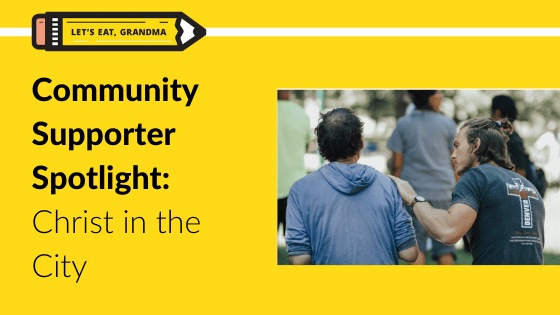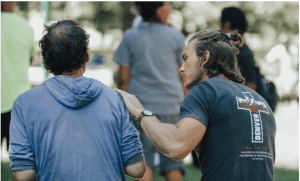Community Supporter Spotlight: Christ in the City

56% of Americans are living paycheck to paycheck, and if they lose their employment, it is likely they will also lose their housing. During a time of increased unemployment and uncertainty, it’s crucial to be compassionate to those struggling. Learn more about Christ in the City (CIC), a nonprofit we’ve partnered with that elevates the Denver community through providing companionship to people experiencing homelessness.
(Want to make a difference for the holidays? Contribute to our donation matching campaign for Christ in the City or any of our other partner organizations here!)
By: Elyse Villanueva | Philanthropy Adminstrator for Let’s Eat, Grandma
Living on the streets is difficult for more than just financial reasons — it can also be incredibly isolating, which can affect other aspects of one’s life. Studies have shown that relationships and a sense of belonging are associated with positive social and psychological functioning, making it easier to bounce back from hard times like losing employment or housing.
Want more job search tips? Sign up for our newsletter!
People who are chronically homeless often don’t have this support or even someone to talk to everyday, leaving them in a difficult position emotionally. This is exactly why CIC volunteers go out and befriend those experiencing homelessness.
We spoke with CIC’s Director of Homeless Outreach, Sam Schultz, to learn more about how they empower their community and provide support for the homeless. (Interview edited for length and clarity.)
What obstacles have people without homes been facing?
On a material level, especially right now during the coronavirus, the lack of resources has been a big issue. We have seen an increase in the homeless population while services have become limited (or done through appointments, and it’s harder to make an appointment if you are homeless.)
They’ve also been experiencing a poverty that goes much deeper than material needs — a poverty of loneliness. The common thread that we see through every homeless story is this radical rupture in relationships, and we are there to address that lack of relationships.
If you did a thought experiment and created a list of all the people you would go to for help before you resorted to living under a bridge or setting up camp downtown, most of us could probably come up with a list of 50 people (family, friends, coworkers, an old coach).
But what if you went through that entire list and for whatever reason, you felt like you couldn’t go to them? Maybe that’s because something happened in the relationship and you don’t talk anymore, your own pride is preventing you from reaching out for help, or maybe there is addiction involved so you don’t feel like you can go to friends or family. If you went through that entire list and crossed out every name, that is a hard place to be, spiritually.
There’s a radical need for close relationships, and so you’d end up on the streets and have that deeper loneliness underlying all the other issues. So, at CIC it’s our mission to encounter people at a deeper level, convince them of their dignity, and get them to know their worth. From there, that’s the motivating center to make steps towards getting into housing or improving their conditions — taking ownership of their life.
How does CIC support the community?
We are, first of all, a formation program for young adults. These young adults come to Denver from all over the country to spend a year living in a community together. They dedicate themselves to their own formation and ministry to the homeless.

They walk the same route every day so they get to know the regulars on that route and start building the friendships with them that are lacking in the homeless community.
For example, last March we started accompanying a deaf and homeless woman. We took her out to coffee and just got to know her. She was in this abusive relationship, so she was in a really hard spot, but as we grew in friendship, she distanced herself from the relationship and decided for herself that she wanted to get into housing. She applied for a housing voucher and is now in housing!
We weren’t social workers offering her services, as good as those are and as much as they are needed, but in this case, our friendship itself was a power to motivate.
There are other friends on the street for whom it doesn’t quite look as bright, but we are still called to walk with them, no matter what. We are successful when we have loved well or when we have built relationships.
What are the best ways we can help?
I would encourage people [when engaging with the homeless] to always see the person first, not the problem that they have, which can be addressed later.
Simple things like asking somebody’s name go a long way, as some people haven’t heard their name spoken to them in months. We once met a man that said, “I haven’t heard my name all summer, you guys are the first ones”.
I’d also recommend maybe even going out of your way to see somebody multiple days in a row. If you have a route you take to work and you know there is a homeless person on your way, you could go out of your way just to say “Hello” to them. With that, we also sometimes like to offer what we call blessing bags as a simple way you both give and open up a conversation.
You just fill a plastic bag with simple supplies like a toothbrush, toothpaste, and a chewy granola bar (some of our friends have bad dental hygiene and aren’t able to chew hard things). Then you can hand that to them and maybe even write a little note, which would make it even more personal, and then wish them a good day.
Better Resume.
Satisfying Career.
Happier You.

